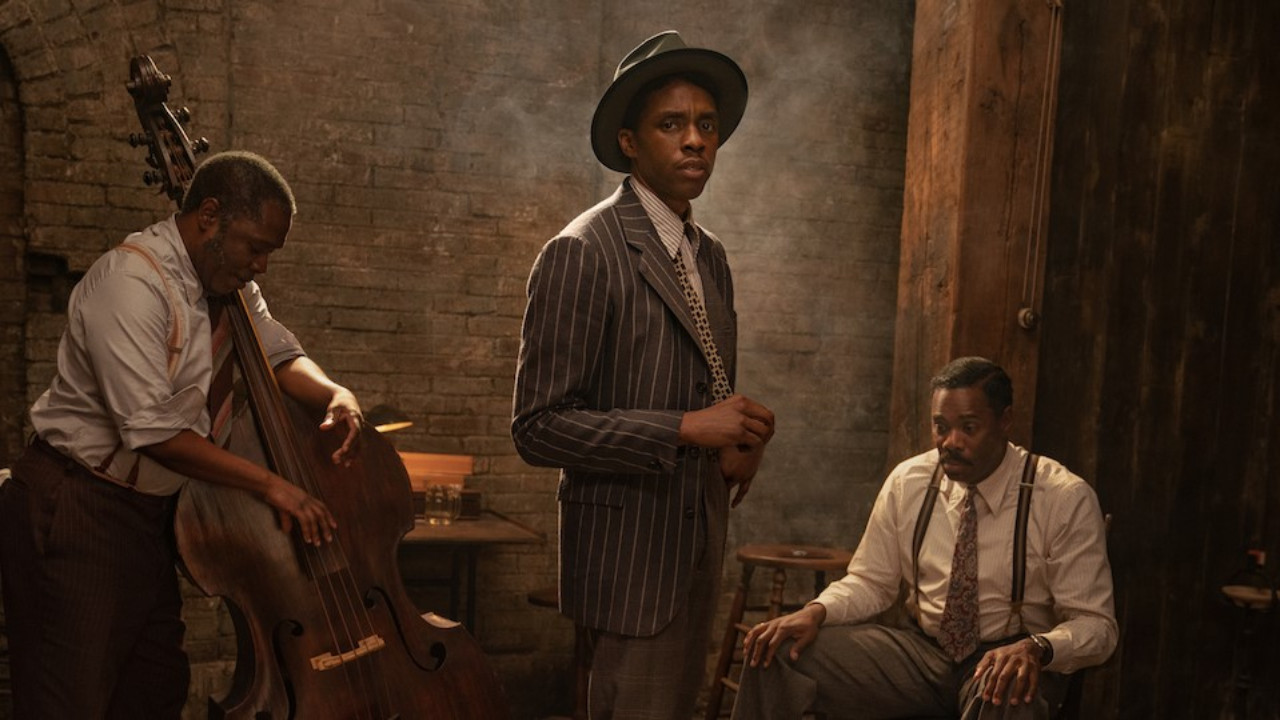GamesRadar+ Verdict
Chadwick Boseman gives this muscular film, Ma Rainey's Black Bottom, added punch and poignancy
Why you can trust GamesRadar+
Your heart breaks a little when Chadwick Boseman’s recklessly ambitious jazz trumpeter Levee insists fiercely to his bandmates in Ma Rainey's Black Bottom: “I got my time coming to me...” Taken from us far too soon, the late actor brings an astonishing, electrifying energy to his final performance.
He’s the dynamo firing up this punchy screen adaptation of August Wilson’s classic play about the exploitation of 1920s singing legend Ma Rainey, the ‘Mother of the Blues’, and her long-suffering band. It’s a worthy capper to Boseman’s career, another role that brings Black history in from the margins, like Marshall (2017) or the Jackie Robinson biopic 42 (2013).
Largely confined to a white-owned Chicago recording studio in an against-the-clock session that Ma (a magisterial Viola Davis) constantly threatens to scupper, the film makes a virtue of the play’s claustrophobia, using the shut-in space as a tense emotional battleground.
Director George C. Wolfe (a Broadway veteran who created Jelly’s Last Jam) attempts to fend off the stagey, talky feel by keeping his camera restlessly mobile, a strategy that’s mostly successful. The camera prowls, slinks and ducks around the bickering band, as Levee fights for his new swinging jazz sound while Ma battles for respect for herself, and her beloved soul-soothing ‘blues’. Gold and ochre visuals point up both the fierce heat and rush of Chicago streets (where the magnificently gowned Ma and her boys are just a Southern “jug band”) and the sharp shadows of the stifling studio.
Wolfe also enlists the session’s relentless tick-tock time pressure to push this lean, tight movie on relentlessly, as the stammering voice intros of rookie Sylvester (Dusan Brown) create a comic pile of wrecked vinyl, and Levee makes a rash lightning move on Ma’s bored girlfriend Dussie Mae (Taylour Page). Bringing the rage from the stage (with a dynamism that escaped producer Denzel Washington’s powerful but over-respectful Fences), the band members’ argumentative storytelling is filled with heartfelt Black struggle. Rape, revenge, racist attacks and near-lynchings are unrolled, a grim Black Lives Matter topicality giving them unsettling resonance nearly a century after the film’s setting.
But the film is swept along by its two potent central performances, Davis generating hefty diva-power with her proud, obstinate, blues-preaching Ma, determined not to be reduced to a ripped-off voice. Boseman’s wiry, angry Levee brings the film’s real charge however, giving every rippling horn improv, fierce God-taunting rant, and soft-shoe shuffle the urgency of a man racing to make his mark with his art. The desperate, eloquent force of his performance gives this muscular film added punch and poignancy.
Kate is a freelance film journalist and critic. Her bylines have appeared online and in print for GamesRadar, Total Film, the BFI, Sight & Sounds, and WithGuitars.com.



